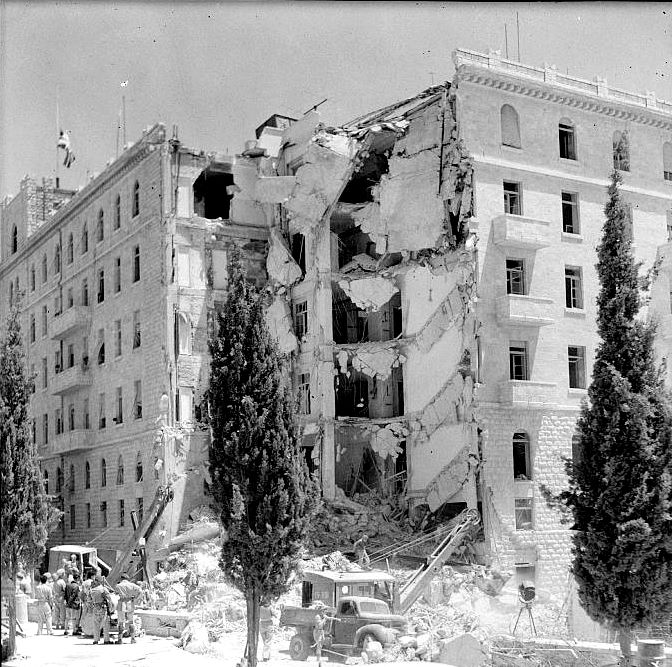
July 22 1946 – 23 Tammuz 5706
In one of the most serious and dramatic attacks in its struggle against the British Mandate government in Palestine, members of the Etzel (a.k.a. Irgun B) resistance organization blew up the south wing of Jerusalem’s stately King David Hotel. The Irgun had formed a united front with the Hagana and the Stern Gang, working together under co-ordinated command to end the British Mandate.
Over the past year, these groups had carried out numerous operations against British targets: liberating illegal Jewish immigrants from the Atlit detention camp, bombing railway tracks as well as a train station, blowing up dozens of British planes, attacking police stations, destroying the radar installation on Mount Carmel, and sabotaging eleven railway bridges in a single night, the infamous “Night of Bridges.”
In this operation’s first stage, Irgun members overpowered the guards at the service entrance to the hotel.
The King David, still one of the most prestigious hotels in the country, opened in 1930. The Mandate administration moved into the hotel’s south wing in 1938, with a Union Jack flying proudly from the roof of the building. The hotel soon became a symbol of the hated British administration, an obvious target after the “Black Sabbath” of roughly a month before, during which 2,700 leading Zionist activists were arrested.
Disguised as Sudanese waiters, the Irgun fighters made their way into the kitchen of the Regency Café on the hotel’s ground floor, where they left seven milk churns propped up against the building’s support beams. Each churn contained fifty kilos of explosives.
Getting out proved much more difficult than getting in. Two British officers accosted the Irgun members on their way out of the hotel. The activists killed one officer and badly wounded the other. Soldiers from the Arab legion opened fire on them as they fled; two were injured, one of whom later died of his wounds.
As soon as its men had exited the building, the Irgun warned the Palestine Post as well as the nearby French Consulate that the south wing was about to explode and should be evacuated. The British denied receiving such a warning, adding that even had they been warned, it would have been too late to get everyone out.
At 12:37 p.m., the whole city was rocked by an enormous explosion, and the hotel’s entire south wing crumpled inward. Over eighty people, mostly civilians, were killed in the attack, and dozens more injured.
The Hagana broke with the Etzel and the Stern gang after the bombing and withdrew from the resistance movement, denouncing the loss of innocent lives and demanding that the Etzel take full responsibility for the attack. Controversy still rages over the incident; periodic accusations fly from both ends of the political spectrum regarding the Hagana’s role in the attack and to what extent the Irgun acted independently.
In any event, Colonel William Nicol Gray, inspector general of the Palestine Police, later admitted that the bombing was a major influence on the British government’s decision to relinquish control of Palestine.
